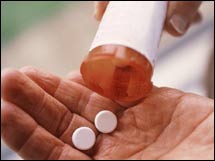|
U.S. Customs relaxes enforcement on drugs from Canada Big Pharma opposes decision to allow limited importation of drugs over United States-Canada border NEW YORK (CNNMoney.com) -- The U.S. Customs department is relaxing its enforcement on the importation from Canada of pharmaceutical drugs for personal use, much to the ire of the industry's trade organization. "It appears innocent enough, but it's the first step down a dark, dangerous road," said Ken Johnson, senior vice president for the Pharmaceutical Research and Manufacturers of America, which represents drug makers and biotechs.
Lynn Hollinger, spokeswoman for U.S. Customs and Border Protection, said the enforcement agency will no longer automatically detain pharmaceuticals being brought into this country from Canada by private citizens. Individuals will not be barred from bringing a 90-day supply for themselves into the U.S., so long as it carried over the border on their person, said Hollinger. But Johnson of PhRMA said there is no way the Food and Drug Administration can ensure the authenticity of drugs that are brought into the country by private citizens. "People think if it's coming back from Canada it must be safe, because Canada is like the U.S., but a lot of the drugs are coming from Third World countries," said Johnson. "We know drugs are being brought into Canada from places like Pakistan, China and Thailand. We have evidence of fake drugs being cooked up in bathtubs in Belize." Johnson reiterated that even though personal importation is now tolerated, it remains illegal. "If you buy drugs over the Internet or from Canada, and it makes you sick and kills you, who do you sue?" said Johnson. "Who is held liable?" Last year, the FDA examined 4,000 parcels containing pharmaceuticals and passing through major U.S. airports, and 1,700 of them claimed that their drugs were made in Canada, said Hollinger. But of those 1,700 shipments, only 15 percent of them were actually made in Canada, while the rest were made in 27 different countries, and 10 percent of them were counterfeit. The multi-billion dollar worldwide counterfeit drug industry is considered a threat to public health, because some of the drugs contain different active ingredients than what they claim, or no active ingredients at all. Pfizer's Viagra, a treatment for sexual dysfunction in men, is a popular target for counterfeit, and OxyContin, a painkiller from Purdue Pharma, is a popular target for theft and abuse. Both of these companies have installed Radio Frequency Identification (RFID) chips in pallets containing drugs to track shipments and try to prevent theft. Johnson of PhRMA said the counterfeiting of name-brand drugs is a "black eye" to the legitimate manufacturers. "It not as much about sales, as it is the reputation of the company and the reputation to the drugs," said Johnson. The legitimate drug industry includes Big Pharma giants like Pfizer (down $0.34 to $27.99, Charts), Merck (down $0.52 to $41.42, Charts), Bristol-Myers Squibb (down $0.10 to $24.52, Charts), Schering-Plough (up $0.17 to $22.10, Charts), Eli Lilly & Co (up $0.16 to $57.76, Charts)., Johnson & Johnson (down $0.72 to $65.11, Charts) and Abbott Laboratories (down $0.79 to $46.35, Charts), and biotechs like Amgen (up $1.76 to $74.73, Charts) and Genentech (up $1.30 to $83.70, Charts). |
|

